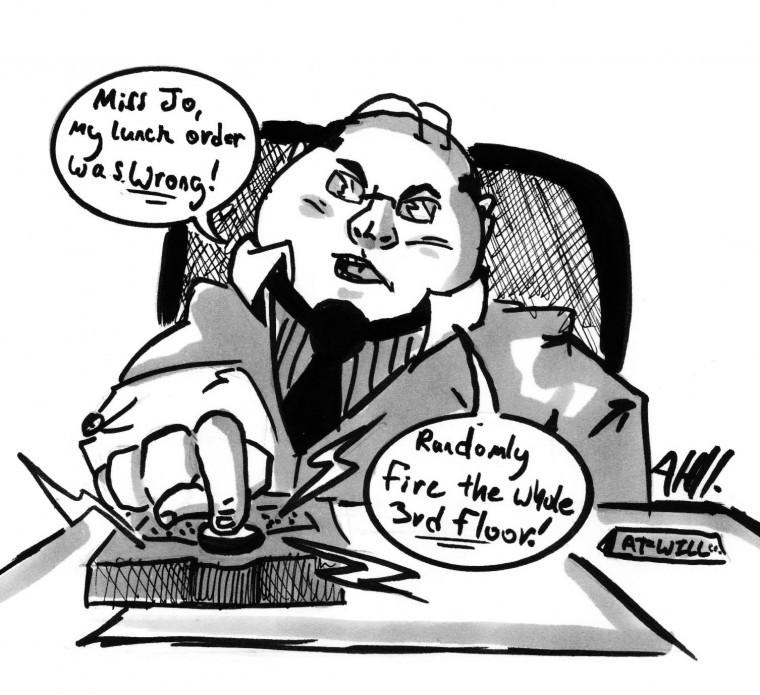Employment at will must be held in check
August 28, 2011
The greatest threat to the current and future prosperity of this nation is the culture of indifference that was in its early adolescence in my generation, and continues to grow in subsequent generations.
Culture of indifference defined is the lack of drive, ambition, and work ethic that leads to unproductive and counterproductive behavior in individuals.
Now before all you old-timers start rejoicing that a youngster has reaffirmed what you all say to each other, it is because you, our elders and guardians, have sold us out to business.
You have sold us out by letting the doctrine of at-will employment go unchecked. If you are employed in the United States, then absent of a contract with a just-cause provision, you can be terminated for any reason other than the constitutionally protected race, gender, creed, etc.
In response to my claim that companies use staffing agencies to lower the cost of labor by terminating temporary employees before 90 days to limit payment of benefits, Terrence Bishop, associate professor at the College of Business with expertise in human resource management, said, “Firing motivated by a pernicious, unjustified, irrational orientation is not healthy for the economy, company, and employment relationship. Other workers see what happens, and of course they quickly put themselves in that person’s shoes.”
The culture of indifference has grown not only because individuals see this happening to other workers, but they have seen it happen to their parents. If children are capable of only attaining jobs like their parents, and they see how their parents are mistreated, what motivation do they have to gain skills and work hard? After all, “among agency temporaries, on-call workers, and direct-hire temporaries, at least half report being unhappy with their work arrangement,” according to a Bureau of Labor Statistics (BLS) report titled, “The Implications of Flexible Staffing Arrangements for Job Security.”
Although at-will employment abuse reaches almost all professions, the hardest hit are blue-collar workers. The exploitation of these individuals is well-documented by the rise of temporary employment through staffing agencies. Since 1990, employment of temporary workers has increased 99.9 percent.
The rise in temporary workers is not due to a rise in temporary jobs, but the growing acceptance of the commodity philosophy of employment.
In response to the question, “are employees and employers equal?” David Wade, associate professor in the College of Business with expertise in employment law, gave a brief history of commodity philosophy:
“An employee and employer, on a practical level, are not equal. If they were equal, there would be, at some point in time, situations where there were more employers looking than employees to be had, and therefore employees would be in the catbird seat. That, in my lifetime, has only occurred once for a period of three to five years during the early 1990s. IT exploded, and we did not have enough IT people. During that time it was common for an IT graduate to get a $55,000 to $75,000 signing bonus. Once employers realized that was not going to end, because universities were only turning out half of what they needed, they outsourced the work to India. Business will find the lowest labor cost.”
Business is business, and those who run businesses are not out to pay the bills, but to make a lot of money, and unfortunately in this global economy, some have to take from their workforce to compete. Although it is important for business to do well, it is more important for workers to survive. Those who are negatively affected by at-will employment gone awry are usually those who can least afford it. Most of these individuals are working for minimum wage and live paycheck to paycheck. Constant disruption in their income is not only harmful to them, but for our whole society.
Legislation has been used in 11 states to limit at-will employment practices, but legislation is not a practical purpose because it will clog up the courts with claims of unjust termination and it does not solve the real issue.
Our trade policies and tax code should be the central focus of the next election. We cannot fool ourselves and think we can compete with labor in less civilized countries, nor should we. It is not wrong for workers to have a floor, TV, cell-phone, car, etc. It is what basic, productive humanity deserves.
And I am all for having a lower tax rate for business, but only if that business contributes to the wellbeing of these United States by employing Americans and employing them for a continued amount time.
For those business majors reading this column, please take heed of Richie Rich’s wise response to van Dough in the 1994 film:
van Dough: “It is our job to cut the fat.”
Richie Rich: “My father never fired anybody. He always said when people are secure in their jobs they work harder, happier and better. So I think if we need to cut the fat, I say we start right here.”







